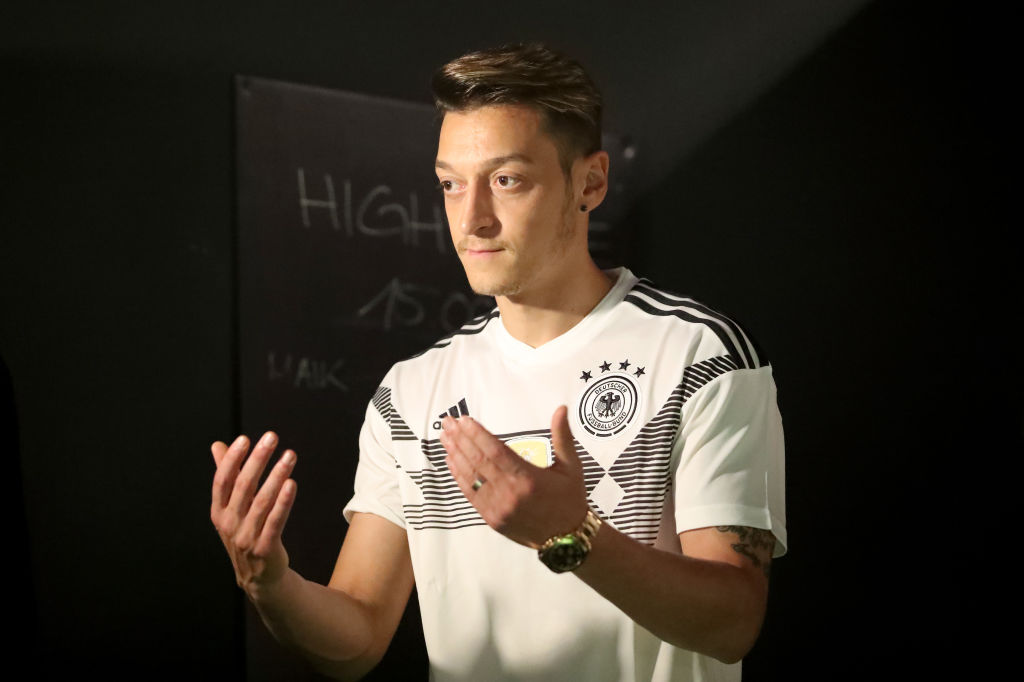What’s the German for ‘The best laid schemes of mice and men gang aft agley’? Mezut Özil (Arsenal) and İlkay Gündoğan (Manchester City) are two of the finest footballers in England’s Premier League. They’re both of Turkish descent, so when Turkey’s president Erdoğan came to London on a state visit, a friendly meeting and a photo opportunity must have seemed like a good idea. However Özil and Gündoğan were both born in Germany, and both play for the German national team. The Deutscher Fussball Bund (and some German politicians and journalists) weren’t best pleased.
Özil gave Erdoğan a football shirt, which was bad enough, but Gündoğan went one stage further. On the shirt he gave to Erdoğan he wrote: ‘For my honoured President, with great respect.’ This infuriated various German politicians, particularly those who (like Özil and Gündoğan) are of Turkish descent. ‘The president of a German international footballer is called Frank-Walter Steinmeier,’ stated Green Party MP, Cem Özdemir. Germany’s leading national newspaper, Die Welt, echoed his indignant sentiments. ‘Give back the shirt, Mr Erdoğan,’ ran their headline. ‘It belongs to Steinmeier.’ It’s a bit like a Teutonic version of Norman Tebbit’s notorious ‘cricket test.’
Is this merely a storm in a Turkish teacup? Well, yes and no. Around three million German citizens are of Turkish descent – by far the biggest minority ethnic group in Germany. Many came to West Germany after the Second World War as so-called Gastarbeiter: ‘guest workers’ employed in manual jobs, rebuilding a defeated, devastated Deutschland. The Bundesrepublik’s Wirtschaftswunder (economic miracle) was fuelled by their sweat and toil. The idea was they’d stay in Germany for a few years, then return to Turkey – a sort of Anatolian Auf Wiedersehen Pet. However it didn’t work out that way. A good many stayed on and had children in Germany. Their children had children in Germany, yet even third generation German Turks were often denied full citizenship. Only in the 1990s, when Germany changed its nationality laws, did these ‘Deutsch-Türken’ acquire equal citizenship rights.
Erdoğan’s accession has inflamed these sensitivities. In 2016, when Germany’s Bundestag voted to define the Ottoman Empire’s massacres of Armenians as genocide, German-Turkish MPs had to be given bodyguards after receiving death threats. In 2017, when Erdoğan held a referendum on increasing his presidential powers, he gave German Turks with dual citizenship a vote. The result shocked German liberals: 63 per cent of German Turks backed Erdoğan, a far higher percentage than in Turkey – where he polled 51 per cent. Only half a million German Turks voted, but since Erdoğan won by less than a million and a half votes this was a significant number. Germany’s biggest selling tabloid, Bild, was quite right to claim that German Turks helped him win.
Conversely, most German Turkish politicians tend to lean towards the left. Against this backdrop their reaction to Gündoğan’s actions makes a lot more sense. ‘It’s a crude foul to pose with the despot Erdoğan in a luxury hotel in London, and dignify him with the title “My President,” while in Turkey democrats are persecuted and critical journalists detained,’ tweeted Sevim Dagdelen, an MP for Germany’s hard left party, Die Linke. ‘German internationals should realise they’re role models for fair play, not just on the pitch.’ Gündoğan’s defence of his actions was equally robust: ‘Are we supposed to be impolite to the president of our families’ homeland?’ he protested. ‘Whatever justified criticism there might be, we decided on a gesture of politeness, out of respect for the office of president, and for our Turkish roots.’
Of course Gündoğan and (to a lesser extent) Özil have been a bit naïve. Back in Turkey, where Erdoğan is running for reelection, photos of the president alongside these superstars will look a lot like endorsements. In a few weeks, Gündoğan and Özil will be representing Germany in the World Cup. ‘Football and the DFB defend values which are not sufficiently respected by Mr Erdoğan,’ said Deutscher Fussball Bund president Reinhard Grindel. ‘Neither one of them was aware of the symbolic value of this photo, but it’s clearly not right and we’ll be talking to them about it,’ said DFB director Oliver Bierhoff (a former German international himself).
The irony is that German Turkish footballers like Gündoğan and Özil (in particular) have frequently been touted as fine examples of how the Bundesrepublik is integrating its German Turks. For all European countries, it’s a familiar story. The first generation of immigrants want to assimilate, yet all too often they’re rejected. The second and third generation have assimilated, yet don’t want to forsake their historic roots. Intriguingly, there is a third Premier League footballer in these photos, alongside Erdoğan: Cenk Tosun, who plays for Everton. Like Gündoğan and Özil, Tosun was born in Germany and represented Germany at youth level. Yet while Gündoğan and Özil went on to play for Germany’s first team, Tosun now plays for Turkey.






Comments